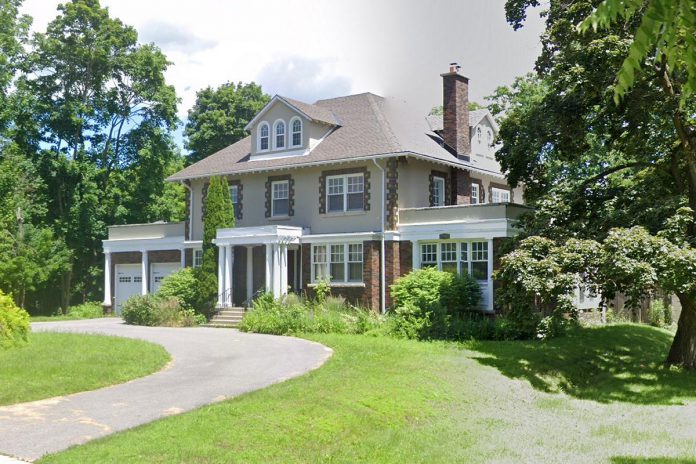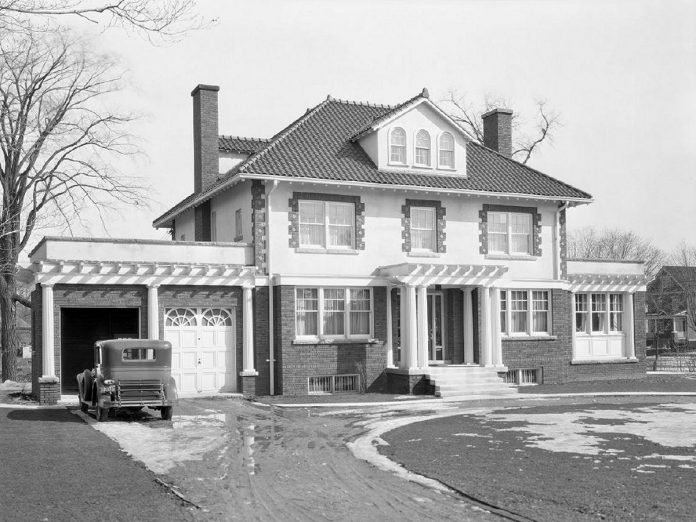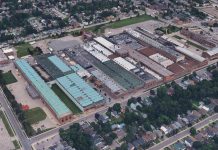
In a surprising reversal of a vote at the previous week’s general committee meeting, Peterborough city council voted in favour of a heritage designation for a historic property at 1400 Monaghan Road known as The Martin House during the regular city council meeting on Monday night (September 23).
The heritage designation prevents the current owner of the property, GTA-based J & J Developments, from tearing down the building or making modifications that would destroy heritage features of the building. The company had purchased the property in late 2023 with the intention of demolishing the building and redeveloping the property’s large lot for a six-storey residential housing complex.
In a report presented to general committee last Monday (September 16), the city’s Peterborough Architectural Conservation Advisory Committee (PACAC) had recommended the building be designated under the Ontario Heritage Act as being a property of cultural heritage value or interest to the City of Peterborough.
Located on the northeast corner of Monaghan Road and Homewood Avenue, The Martin House was built between 1930 and 1931 for local businessman Herbert Samuel Martin — an innovator in the emerging industry of corrugated containers in the early 20th century — by Henry Thomas Hickey.
Hickey was a prolific contractor who worked on more than 100 buildings in Peterborough, including the old Hunter Street Post office in 1906, the duplex at 5 Fleming Place in 1916, and the Hunter Street Bridge in 1920. He also worked on buildings in Toronto, Bethany, Curve Lake, Lindsay, and other locations.
“1400 Monaghan Road has cultural heritage value or interest as a unique example of a residence for an affluent owner executed in a blend of the Spanish Colonial and Georgian Revival styles in Peterborough,” reads the PACAC report. “The residence retains many of the original exterior features which define the Spanish and Georgian Revival styles as well as residential design reflecting social and technological changes following the First World War.”
“The residence integrates seamlessly into the Old West End, a neighbourhood which reflects the emerging ideals of interwar suburbanization. With its carefully conceived design, massing, and materiality 1400 Monaghan Road is a sympathetic and significant contributor to the overall character of the turn-of-the-century neighbourhood.”

When considering the heritage designation at the September 16 general committee meeting, councillors had discussed the current condition of the building, which was allowed to fall into disrepair by the previous owner and whose interior has been damaged by a water leak, as well as the developer’s concepts for redevelopment of the property.
The general committee vote to designate The Martin House as a heritage property lost 4-6, with councillors Joy Lachica, Alex Bierk, Keith Riel, and Gary Baldwin voting in favour and councillors Don Vassiliadis, Dave Haacke, Andrew Beamer, Kevin Duguay, Lesley Parnell, and mayor Jeff Leal voting against. Councillor Matt Crowley was absent from the meeting.
When considering the heritage designation at the September 23 city council meeting, councillors heard a delegation from John Cooper, principal of J & J Developments.
“The severe damage inside the building was a result of neglect by the previous owner after eight years of being vacant,” Cooper said with respect to the building’s condition. “Given the house was in such a state of disrepair, we developed a vision of revitalizing the site to meet the needs of this growing community.”
Cooper said his company hired Peterborough-based architectural firm Unity Design Studios (formerly Lett Architects Inc.) to “prepare early concepts for the site” and the company is in the “very early stages” of preparing to file a rezoning application to the city.
“While we deeply respect Peterborough’s rich history and the importance of preserving its heritage, this designation request would effectively kill our proposed development without providing us the opportunity to go through the public application process required by the Planning Act,” Cooper said. “Had the property been designated prior to our purchase, we most certainly would not have bought it.”
Councillor Lachica asked Cooper if he was aware the property was listed in the City of Peterborough’s heritage register. The heritage register is a list of properties identified as having cultural heritage value or interest that are designated or could be designated.
“We understood it was listed,” Cooper said.
“So you understood it could be designated before the end of the year, which has now been extended by the province to two years in order to have listed properties be designated?” asked Lachica. “You knew that when you purchased it, then?”
Lachica was referring to the province’s requirement under the More Homes Built Faster Act for municipalities to review their heritage registers by January 1, 2025, identifying properties on the registers that would be designated and removing other properties from the registers so they could be made available for potential development.
Cooper replied that, while his company was aware the property was listed on the heritage property, at no point did the city’s heritage staff inform them of their intention to designate the property.
Following Cooper’s delegation, Peterborough lawyer and former city councillor Ann Farquharson spoke in favour of the designation of The Martin House, pointing out that the developers purchased the property “for a bargain” — $1.1 million according to Farquharson — with the intent of tearing down the building so the lot could be developed.
“You don’t go and decide to tear down one of the most spectacular properties in the city to use it as a vacant lot,” said Farquharson, suggesting the building could be used for other options such as an art gallery, or the developer could rehabilitate the building or recoup their investment by selling to someone else who would restore the building.
“If they’ve spent more than than on architects and everything, well, that’s presumptuous — they shouldn’t have done that,” she said. “If they wanted to demolish, they should have come to council for a demolition permit. They would have had to give you 60 days’ notice (for a property listed in the heritage register) and you would have had to decide whether it was worthy of designation. They didn’t do that.”
Later on in the meeting, councillors returned to the heritage designation item, with the discussion involving many of the same points made at the previous week’s general committee meeting.
Councillor Haacke reiterated his concern about the city designating a heritage property against the wishes of the owner, something councillor Parnell agreed with while also repeating her concerns about the unsafe condition of the interior of the house, although she admitted she has not seen the inside of the house.
Councillor Bierk reiterated his support for the heritage designation, noting that the designation does not preclude any development on the property.
“By us designating this site tonight, it doesn’t negate the developers from working with our staff to come back to the drawing — to come to the drawing board, not back — to come to the drawing board and work with our staff within some of the parameters that the designation will set,” he said. “I truly do believe there is a solution to be found here for everybody.”
“For us tonight, we’re looking at the importance of preserving sites — not this site but sites like this — and we can’t go back from it. Once that house is demolished, we can’t get it back.”
City council then voted 6-5 in favour of the heritage designation, with councillors Lachica, Bierk, Riel, Baldwin, Vassiliadis, and Crowley voting for the designation and councillors Haacke, Beamer, Duguay, Parnell, and mayor Leal voting against it.
The difference from the general committee vote is that councillor Vassiliadis changed his vote and councillor Crowley, who was absent from the general committee meeting, voted in favour of designation.



























